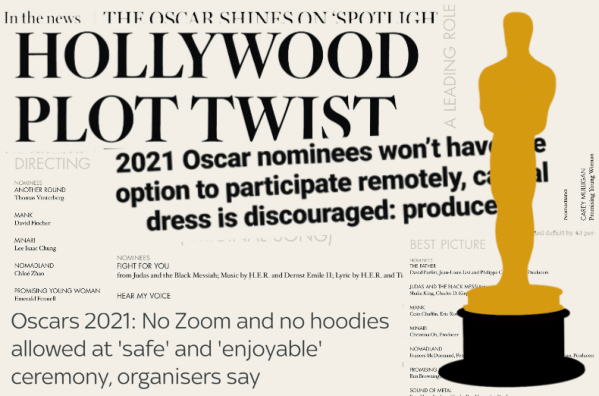Celebrating more BIPOC and women in the film industry
The Oscars don’t hold a lot of weight in cinema anymore. They’re less important than international film festivals. The Oscars don’t nominate enough people of color or celebrate female filmmakers, they read the wrong film for best picture and the list goes on.
Last year, when the nominations came out, I wrote about how no female directors were nominated for best director, and how the academy overlooked really wonderful films and performances from people of color. I wrote that I wouldn’t be surprised when some boring film directed by a white guy won best picture. Oh, how I loved being proved wrong.
Last year, “Parasite” took home best picture and best international feature film, with director Bong Joon-ho scoring the award for best director, and a woman took home the award for best original score (which is a rare feat) with Hildur Guðnadóttir winning for her work on “Joker.”
This year, the nominations look even better and more diverse, with movies I actually enjoyed watching. In the directing category, Chloé Zhao scored a nomination for directing “Nomadland,” and she is the first woman of color to be nominated for best director (and she’s predicted to win).
Emerald Fennell is nominated for directing “Promising Young Woman,” making the 2021 Oscars the first to ever have two women nominated in the best director category. Only one woman has ever won—Kathryn Bigelow for “The Hurt Locker.”
Also, two Black women are up for best actress, for the first time since 1973: Viola Davis for “Ma Rainey’s Black Bottom” and Andra Day for “The United States vs. Billie Holiday.” For the first time ever, two men of Asian heritage are up for best actor: Riz Ahmed, who is British and Pakistani, is nominated for his performance in “Sound of Metal,” and Steven Yeun, who was born in South Korea and raised in the U.S., is nominated for his acting in “Minari.” Ahmed is also the first Muslim man to be nominated for best actor. As you can see, there are quite a few exciting firsts this year.
Before the nominations came out, I was ready to write an article on how wrong it was for the Golden Globes to put “Minari” in the category for best foreign language film, when the movie is, in its purest form, a story about the American dream. It tells the story of a Korean-American family moving to Arkansas so the father, played by Yeun, can follow his dream of becoming a farmer to provide for his family. What’s more American than farming in Arkansas? But the academy surprised me this year—maybe they read my scathing article from last year.
Also for “Minari,” Yuh-Jung Youn earned a nomination for best supporting actress for her role as Yeun’s mother-in-law. Youn is the first South Korean actor to do so last year, when “Parasite” was up for best picture with an entirely South Korean cast, it garnered no acting nominations at all. This year is also the first time two Asian directors are nominated in the best director category, with Lee Isaac Chung nominated for “Minari” and Chloé Zhao nominated for “Nomadland.”
There are some snubs, however, mostly towards Black actors and directors. For their performances in “Judas and the Black Messiah,” LaKeith Stanfield and Daniel Kaluuya were both nominated for best supporting actor, when Stanfield is the lead and not a supporting actor. Spike Lee’s “Da 5 Bloods” was snubbed almost entirely, picking up only one nomination for best score, and “Ma Rainey’s Black Bottom” didn’t garner a best picture nomination either. “Judas and the Black Messiah” is the only drama led by Black actors to have made the cut for best picture.
Still, the nominees this year are a far cry from last year, where movies about white men directed by white men dominated the nominations.
However, the Oscars should still be less about praising white men for the films they’ve been making and remaking forever. It’s not that women and people of color aren’t making films that are Oscar worthy, it’s that the academy and the mainstream media don’t always pay attention to those films.
Lee, after his snub for directing “Da 5 Bloods” at the Golden Globes earlier this month, summed it up perfectly: “In no uncertain terms, we’ve seen many more voices and films reflecting—a better reflection of this mosaic of the United States of America.”
We need to continue encouraging people to make, watch and enjoy those films. Only then will the Oscars look more like Lee’s mosaic metaphor, and only then will I not need to criticize award shows so much. All of the “firsts” this year are amazing, don’t get me wrong. But we need to push for award shows and film praises where women and Black, Indigenous and people of color at the forefront of awards is considered the norm instead of a record-breaking event.














































